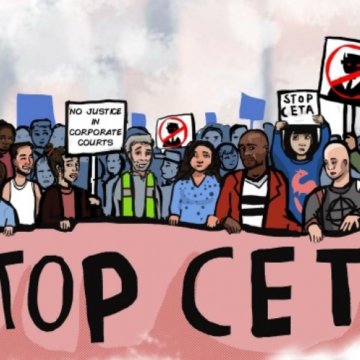- About
- Topics
- Picks
- Audio
- Story
- In-Depth
- Opinion
- News
- Donate
- Signup for our newsletterOur Editors' Best Picks.Send
Read, Debate: Engage.
| located: | Belgium, Canada |
|---|---|
| editor: | Maria João Morais |
Although few Europeans know what CETA is, the free trade agreement between the European Union and Canada was passed last week in the European Parliament. Negotiated without political debate in most of the countries it covers, CETA (alongside its sister treaty, the TTIP) sparked a surging wave of rejection in European.
However, despite the creation of hundreds of citizen groups across Europe protesting against the new treaty, a majority of MEPs decided to give the green light to CETA, which has provisionally come into effect.
According to Brussels, by eliminating custom duties between the EU and Canada, the treaty could generate 12 billion euros a year to European economies, boosting trade growth and creating thousands of new jobs.
However, activists opposed to CETA warn that the treaty represents an opportunity… for large multinationals. If investors don’t obtain the profit they were expecting, they will be able to turn to arbitration tribunals, which can prevail over national courts. By opening the door to the use of these courts to resolve issues between companies and national governments, CETA is providing a mechanism that facilitates coercion by multinationals in decisions made by administrations. Furthermore, the treaty also leaves consumers unprotected by lowering product quality standards.
Finally, campaigners claim that CETA damages progress being made in the battle against climate change, as the treaty fails to recognise targets agreed in the recent Paris climate agreement.
While the implementation of the treaty is slowly advancing, hope remains for activists, as ratification is still needed in each national parliament. Given the scale of the social protests against the treaty, at a time when the benefits of free trade and globalisation are increasingly being called into question, it’s fully expected that citizens will once again raise their voice. Perhaps it will finally become too loud to be ignored, leading the treaty to collapse.
Photo: Corporate Europe Observatory
